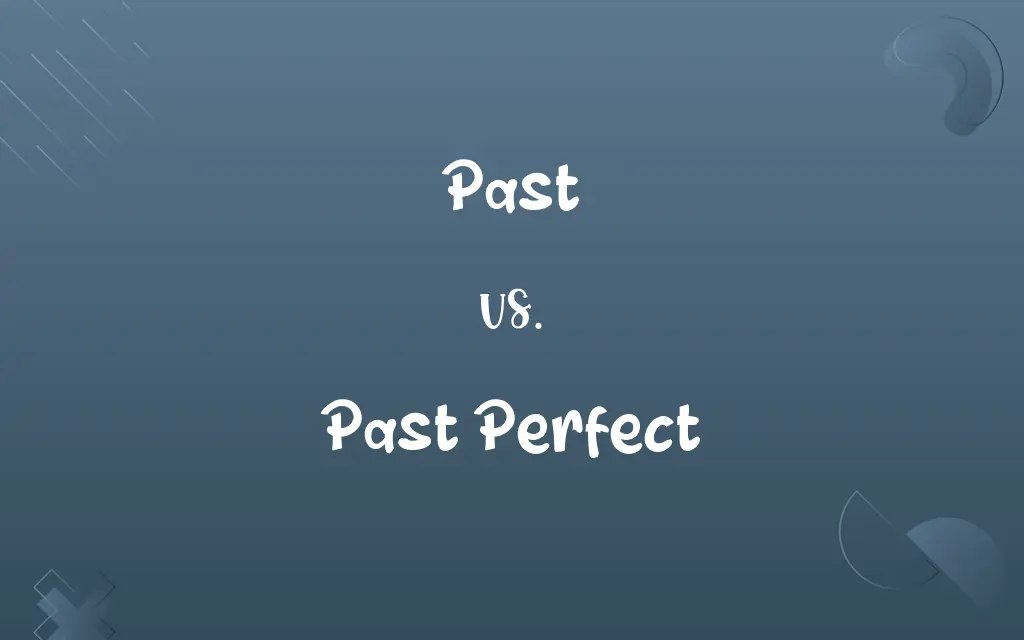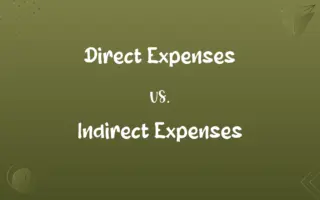Past vs. Past Perfect: Know the Difference

By Shumaila Saeed || Published on January 21, 2024
The past tense describes actions completed in the past, while the past perfect tense indicates actions completed before another past action or time.

Key Differences
The past tense in English is used to describe actions or events that happened at a specific time in the past. In contrast, the past perfect tense is used to express actions that were completed before another action in the past.
Shumaila Saeed
Jan 21, 2024
The past tense is straightforward in its application, often simply adding -ed to regular verbs. The past perfect, however, is formed using 'had' followed by the past participle of the verb, indicating a deeper layer of time in the past.
Shumaila Saeed
Jan 21, 2024
While the past tense narrates events as they happened, the past perfect gives context to these events, showing a sequence or a cause-and-effect relationship between two past actions.
Shumaila Saeed
Jan 21, 2024
An action in the past perfect can indicate a condition that was met or an action that occurred leading to another event in the simple past. This contrasts with the simple past, which doesn't imply any such sequence or condition.
Shumaila Saeed
Jan 21, 2024
The past perfect is often used in conjunction with the simple past to tell a more complete story about what happened and what had happened before that, giving a clearer understanding of the sequence of events.
Shumaila Saeed
Jan 21, 2024
ADVERTISEMENT
Comparison Chart
Basic Function
Describes completed actions in the past
Indicates an action completed before another past action
Shumaila Saeed
Jan 21, 2024
Formation
Regular verbs: add -ed; Irregular verbs: various forms
Use 'had' + past participle of the verb
Shumaila Saeed
Jan 21, 2024
Example Sentence
"She walked to the store."
"She had walked to the store before it closed."
Shumaila Saeed
Jan 21, 2024
Contextual Use
To narrate events or describe past states
To show causality or sequence in past events
Shumaila Saeed
Jan 21, 2024
ADVERTISEMENT
Past and Past Perfect Definitions
Past
It is used to describe a completed action in a time before now.
He cooked dinner an hour ago.
Shumaila Saeed
Jan 04, 2024
Past Perfect
It expresses the duration of an action that occurred before another time in the past.
They had lived in Paris for ten years before moving.
Shumaila Saeed
Jan 04, 2024
Past
The past tense can express a habit or repeated action in the past.
She often visited her grandparents.
Shumaila Saeed
Jan 04, 2024
Past Perfect
It is used to show causality between two past events.
After he had eaten, he felt better.
Shumaila Saeed
Jan 04, 2024
Past
It can describe a past state or situation.
They were happy in their old house.
Shumaila Saeed
Jan 04, 2024
ADVERTISEMENT
Past Perfect
The past perfect often sets the scene for another action in the narrative.
The guests had arrived when the party started.
Shumaila Saeed
Jan 04, 2024
Past Perfect
The past perfect can indicate a condition that was met in the past.
She had never seen a bear before that day.
Shumaila Saeed
Jan 04, 2024
Past
Having existed or occurred in an earlier time; bygone
Past events.
In years past.
Shumaila Saeed
Jan 04, 2024
Past Perfect
The past perfect describes an action completed before another action in the past.
He had finished his homework before watching TV.
Shumaila Saeed
Jan 04, 2024
Past
Having served formerly in a given capacity, especially an official one
A past president.
A past inmate of a cell.
Shumaila Saeed
Jan 04, 2024
Past
(Grammar) Of, relating to, or being a verb tense or form used to express an action or condition prior to the time it is expressed.
Shumaila Saeed
Jan 04, 2024
Past
Previous background, career, experiences, and activities
An elderly person with a distinguished past.
Shumaila Saeed
Jan 04, 2024
Past
A former period of someone's life kept secret or thought to be shameful
A family with a checkered past.
Shumaila Saeed
Jan 04, 2024
Past
Beyond in position; farther than
The house is a mile past the first stoplight. They walked past the memorial in silence.
Shumaila Saeed
Jan 04, 2024
Past
Beyond the power, scope, extent, or influence of
The problem is past the point of resolution.
Shumaila Saeed
Jan 04, 2024
Past
Beyond in development or appropriateness
The child is past drinking from a bottle. You're past sucking your thumb, so don't do it.
Shumaila Saeed
Jan 04, 2024
Past
Beyond the number or amount of
The child couldn't count past 20. See Usage Note at pass.
Shumaila Saeed
Jan 04, 2024
Past
The period of time that has already happened, in contrast to the present and the future.
A book about a time machine that can transport people back into the past
Shumaila Saeed
Jan 04, 2024
Past
(postmodifier) Following expressions of time to indicate how long ago something happened; ago.
Shumaila Saeed
Jan 04, 2024
Past
Of a period of time: having just gone by; previous.
During the past year
Shumaila Saeed
Jan 04, 2024
Past
(grammar) Of a tense, expressing action that has already happened or a previously-existing state.
Past tense
Shumaila Saeed
Jan 04, 2024
Past
Beyond in place or quantity
The room past mine
Count past twenty
What's the time? - It's now quarter past twelve midday (or 12.15pm).
Shumaila Saeed
Jan 04, 2024
Past
Passing by, especially without stopping or being delayed.
Ignore them, we'll play past them.
Please don't drive past the fruit stand, I want to stop there.
Shumaila Saeed
Jan 04, 2024
Past
Of or pertaining to a former time or state; neither present nor future; gone by; elapsed; ended; spent; as, past troubles; past offences.
Shumaila Saeed
Jan 04, 2024
Past
A former time or state; a state of things gone by.
The present is only intelligible in the light of the past, often a very remote past indeed.
Shumaila Saeed
Jan 04, 2024
Past
Beyond, in position, or degree; further than; beyond the reach or influence of.
Until we be past thy borders.
Love, when once past government, is consequently past shame.
Shumaila Saeed
Jan 04, 2024
Past
Above; exceeding; more than.
Not past three quarters of a mile.
Bows not past three quarters of a yard long.
Shumaila Saeed
Jan 04, 2024
Past
A earlier period in someone's life (especially one that they have reason to keep secret);
Reporters dug into the candidate's past
Shumaila Saeed
Jan 04, 2024
Past
Earlier than the present time; no longer current;
Time past
His youth is past
This past Thursday
The past year
The present leader
Articles for present use
The present topic
The present system
Present observations
Shumaila Saeed
Jan 04, 2024
Past
Of a person who has held and relinquished a position or office;
A retiring member of the board
Shumaila Saeed
Jan 04, 2024
Past
A verb tense or other construction referring to events or states that existed at some previous time;
Past participle
Shumaila Saeed
Jan 04, 2024
Past
The past tense denotes an action or event that occurred in the past.
They watched a movie last night.
Shumaila Saeed
Jan 04, 2024
Past
The past tense is used in storytelling to narrate events.
The sun set, and the stars appeared.
Shumaila Saeed
Jan 04, 2024
Repeatedly Asked Queries
What is the past perfect tense?
The past perfect tense indicates actions that were completed before another past action or time.
Shumaila Saeed
Jan 21, 2024
How is the past tense formed?
The past tense is formed by adding -ed to regular verbs, or using the past form for irregular verbs.
Shumaila Saeed
Jan 21, 2024
Can the past tense be used alone?
Yes, the past tense can stand alone to describe completed actions or states in the past.
Shumaila Saeed
Jan 21, 2024
Can the past perfect describe duration?
Yes, the past perfect can describe the duration of an action up to a certain point in the past.
Shumaila Saeed
Jan 21, 2024
What is the past tense?
The past tense describes actions or events that occurred at a specific time in the past.
Shumaila Saeed
Jan 21, 2024
How do you form the past perfect tense?
Form the past perfect by using 'had' followed by the past participle of the verb.
Shumaila Saeed
Jan 21, 2024
Does the past perfect need another past action to make sense?
Often, yes. The past perfect is usually used in relation to another past action or time.
Shumaila Saeed
Jan 21, 2024
Do time expressions accompany the past perfect?
Often, phrases like 'before' or 'by the time' accompany it.
Shumaila Saeed
Jan 21, 2024
Is context important for using the past perfect?
Absolutely, context is key to appropriately using the past perfect.
Shumaila Saeed
Jan 21, 2024
Can the past tense express duration?
Not typically; it's more about a specific point in time.
Shumaila Saeed
Jan 21, 2024
Is the past perfect common in spoken English?
It's less common in casual speech but used for clarity in storytelling and formal contexts.
Shumaila Saeed
Jan 21, 2024
Is the past tense used for habits?
Yes, the past tense can describe habits or repeated actions in the past.
Shumaila Saeed
Jan 21, 2024
Is the past perfect always necessary?
No, it's used for specific contexts to show sequence or causality in the past.
Shumaila Saeed
Jan 21, 2024
Do all verbs have a unique past tense form?
No, some verbs are irregular and have unique past forms.
Shumaila Saeed
Jan 21, 2024
Can you mix past and past perfect in a sentence?
Yes, they're often used together to show the sequence of past events.
Shumaila Saeed
Jan 21, 2024
Are there exceptions to forming the past tense?
Yes, irregular verbs don't follow the standard -ed pattern.
Shumaila Saeed
Jan 21, 2024
What's an example of the past perfect tense?
"She had played tennis before the rain started."
Shumaila Saeed
Jan 21, 2024
Is the past perfect used in conditional sentences?
Yes, it's often used in the 'if' clause of third conditional sentences.
Shumaila Saeed
Jan 21, 2024
Can past perfect be used for hypothetical situations?
Yes, it can indicate hypothetical or unreal past situations.
Shumaila Saeed
Jan 21, 2024
Share this page
Link for your blog / website
HTML
Link to share via messenger
About Author
Written by
Shumaila SaeedShumaila Saeed, an expert content creator with 6 years of experience, specializes in distilling complex topics into easily digestible comparisons, shining a light on the nuances that both inform and educate readers with clarity and accuracy.









































































